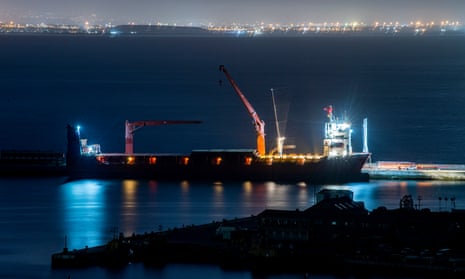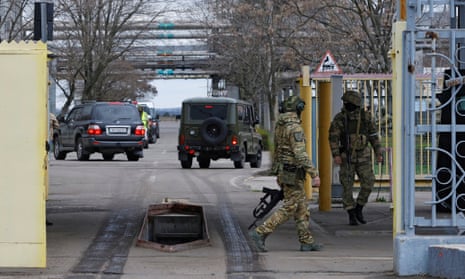Russian retreat in Bakhmut highlights ‘shortage of credible combat units’, says UK MoD
Ukrainian forces have regained at least a kilometre of territory in Bakhmut amid a Russian withdrawal that reflects its “severe shortage of credible combat units”, the latest UK intelligence briefing has said.
The Ministry of Defence said that over the past four days, elements of Russia’s 72nd separate motor rifle brigade (72 SMRB) likely withdrew “in bad order” from their positions on the southern flank of the Bakhmut operation.
The area was tactically significant because it was a Russian bridgehead on the western side of the Donets-Donbas canal, which marked the front line through parts of the area, the ministry said in its update, posted on Twitter.
72 SMRB is an element of Russia’s 3rd Army Corps, a formation created in autumn 2023 and dogged with allegations of poor morale and limited combat effectiveness.
Its deployment to such a demanding and operationally important sector highlights Russia’s severe shortage of credible combat units.
Key events
Opening summary
Hello and welcome back to our coverage of Russia’s war on Ukraine, now in its 444th day. I’m Adam Fulton and here’s a look at the latest.
Ukrainian forces have regained at least a kilometre of territory in Bakhmut amid a Russian withdrawal that reflects Moscow’s “severe shortage of credible combat units”, the UK Ministry of Defence has said in its latest intelligence briefing.
It said elements of a Russian brigade withdrew “in bad order” from their positions on the southern flank of the eastern Ukrainian city, scene of the war’s longest battle. The brigade had been “dogged with allegations of poor morale and limited combat effectiveness”.

More on that story soon. In other developments:
-
Russian-installed officials in Luhansk have said missiles fired by Ukrainian forces had injured six children and a Russian parliamentarian and damaged two disused factories in the eastern Ukrainian region’s main city, around 100km (60 miles) behind the frontlines.
-
Two Russian pilots were killed when a Russian Mi-28 military helicopter crashed in the annexed peninsula of Crimea, Russian news agencies reported, citing the defence ministry. It said it believed the reason for Friday’s crash was equipment failure, Tass reported.
-
The Ukrainian president, Volodymyr Zelenskiy, has thanked the British prime minister, Rishi Sunak, for the provision of long-range cruise missiles. The UK defence secretary, Ben Wallace, earlier confirmed it would send the Storm Shadow missiles, prompting a threat from the Kremlin of a military response.
-
Police in the Russian city of St Petersburg have created an anti-drone unit to detect unmanned drones after a suspected attack on the Kremlin last week. The unit launched on Tuesday during the annual second world war victory day celebrations on St Petersburg’s Palace Square, the city’s interior ministry said.
-
South Africa’s foreign ministry has summoned the US ambassador over allegations he made that the country had provided arms and ammunition to Russia for its war in Ukraine. Reuben Brigety said on Thursday that South Africa had loaded weapons and ammunition on to a Russian vessel, which is under sanctions, at the Simon’s Town naval base near Cape Town in December last year and that the arms were then transported to Russia.

-
Russia’s defence ministry has said Ukrainian forces carried out “offensive operations” along the entire line of contact near Soledar, the ministry’s official Zvezda news outlet reported. More than a thousand troops and up to 40 tanks were used in Thursday’s assault, it said on Friday, adding that the attacks were “repulsed”.
-
The UN nuclear watchdog chief, Rafael Grossi, plans to present an agreement with Russia and Ukraine on protecting the Zaporizhzhia nuclear power plant to the UN security council this month, indicating a deal is close, four diplomats have told Reuters. Grossi has been trying for months to secure an agreement to reduce the risk of a catastrophic accident from shelling at the Russian-occupied nuclear power station, Europe’s biggest.

-
Rishi Sunak, the British prime minister, has expressed disappointment at a decision to block Volodymyr Zelenskiy’s request to speak via video at Saturday’s Eurovision grand final. The European Broadcasting Union, which produces the event, said the Ukrainian president had “laudable” intentions but rejected the request over fears it could politicise the event.

